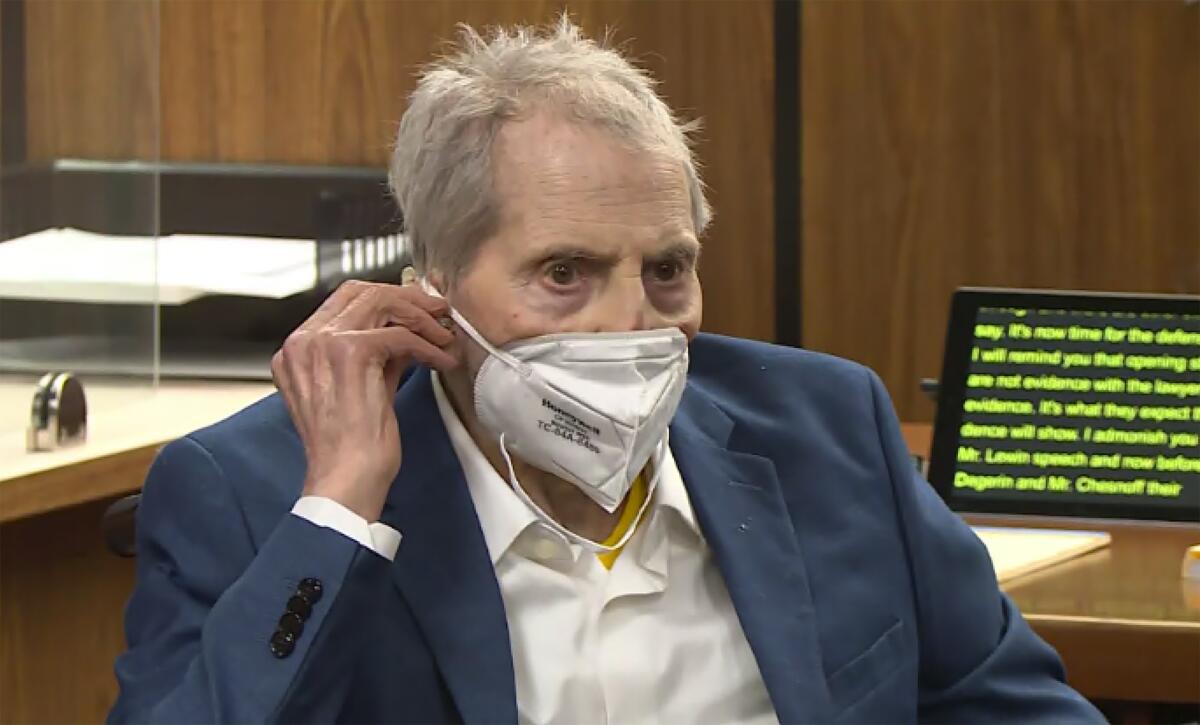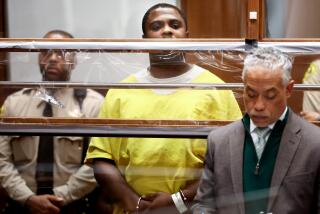Prosecution rests at Robert Durst murder trial

L.A. County prosecutors rested their case Tuesday against Robert Durst, wrapping up months of testimony aimed to prove the real estate heir killed his best friend to cover up his alleged role in his wife’s disappearance nearly four decades ago.
While Durst is charged only with the 2000 murder of Susan Berman inside her Benedict Canyon home, the prosecution has spent 11 weeks walking the jury through the other deaths that have marked Durst’s life: the 1982 vanishing of his wife, Kathleen, and the killing of his neighbor, Morris Black, in Texas in 2001.
Prosecutors have alleged Durst shot Berman, his longtime confidante, more than 20 years ago to stonewall a resurgent investigation into Kathleen’s disappearance. Durst once told Berman — an author and college friend who sometimes functioned as his media spokeswoman — that he had killed his wife; Berman also said she helped him arrange a false alibi shortly after Kathleen vanished, several witnesses have testified.
Durst’s 2015 arrest in New Orleans drew widespread media attention, coming one day before the finale of an HBO documentary series, “The Jinx,” that reinvigorated national interest in the New York aristocrat’s checkered legal history.
But his long-delayed trial has been a far more muted affair.
The 78-year-old was initially meant to stand trial in March 2020, but proceedings were suspended indefinitely as the COVID-19 pandemic all but paralyzed the nation’s largest court system. Prosecutors also chose to preserve some of the most explosive testimony years ago, out of concern that older witnesses might die before the trial, meaning some of the most dramatic details of the proceedings have been public knowledge for some time.
One of the final witnesses the prosecution presented to the jury last week, Nick Chavin, first testified in 2017 that Durst admitted to killing Berman.
“I had to. It was her or me. I had no choice,” Durst said outside a New York City restaurant in 2014, according to Chavin.
Chavin — an advertising executive and longtime friend of both the defendant and the woman he’s accused of killing — also testified that Durst had told Berman he killed his wife, information Berman relayed to Chavin before her murder.
Other potentially damaging taped testimony against Durst came from Dr. Peter Wilk, Kathleen’s medical school mentor. Wilk said Kathleen once told him she lived in fear of Durst and was concerned he might kill her. The archived testimony buttressed other witnesses who suggested that Durst had been abusive and that his marriage was collapsing at the time of Kathleen’s disappearance.
Chavin and Wilk’s testimony made up a few of the dozens of hours of archived testimony prosecutors have either aired or read into the record since May. Jurors have also listened to taped testimony from other Durst associates, listened to prosecutors act out transcripts from Durst’s acquittal on murder charges in Texas in 2003, and heard recorded interviews between L.A. County Deputy Dist. Atty. John Lewin and Durst as well as unedited audio recordings created as part of “The Jinx.”
In the closing seconds of the documentary, Durst is heard to mutter, “Killed them all, of course,” while in a bathroom, apparently unaware he was being recorded. The comments have been widely interpreted as a confession.
But Dick DeGuerin, Durst’s lead defense attorney, has dismissed the recording as a “hatchet job” that was heavily manipulated by the filmmakers.
Still, some live witnesses delivered damaging testimony against Durst in recent weeks. Laraine Newman, a voice actor and friend of Berman who was part of the original cast of “Saturday Night Live,” told the jury Berman had once said she helped Durst stage an alibi related to Kathleen’s disappearance.
On Feb. 1, 1982, someone called the associate dean of the Albert Einstein College of Medicine claiming to be Kathleen Durst, saying she was too sick to attend the first day of her clerkship in the pediatric unit. Prosecutors have argued that Kathleen was already dead and that someone else made the call to obscure the timeline of any police investigation into her disappearance. Prosecutors have long believed that woman was Berman.
The trial thus far has focused as much on Durst’s health as it has on his culpability in Berman’s death. Since May, Durst’s attorneys have repeatedly argued that their client — who has both bladder and esophageal cancer and has been seated in a wheelchair with a urine bag for much of the trial — is too ill to be prosecuted.
Durst was hospitalized shortly before a hearing in early June, and his defense team filed a motion seeking a mistrial last week, arguing he was too sick to testify in his own defense. Los Angeles County Superior Court Judge Mark Windham swiftly slapped down the motion Monday, noting Durst has been able to engage with his legal team, take notes and follow court proceedings for months.
“If Mr. Durst is suffering, he does not show it,” Windham said Monday.
Lewin and DeGuerin have squared off in a number of aggressive exchanges during the trial, with their back-and-forth often reaching a boiling point around the topic of Durst’s health. Lewin has repeatedly accused Durst and his legal team of overstating his health problems because, he said, they know they are doomed to defeat once the case is in the hands of a jury.
“What they want is a mistrial any way they can do it ... although Mr. Durst has health issues, he is absolutely manipulating these proceedings,” Lewin said Monday.
Durst’s defense began presenting its case late Tuesday afternoon. During his opening statement, DeGuerin repeatedly harped on the fact that prosecutors lack any physical evidence tying Durst to the crime scene and urged jurors to tune out testimony related to Kathleen’s disappearance or Black’s death.
Durst is expected to testify that he found Berman’s body and wrote the so-called cadaver note, a key piece of evidence mailed anonymously to Beverly Hills police in 2000 listing her Benedict Canyon address. The note had the same spelling error as one contained on the envelope of a letter Durst sent to Berman in 1999, which was discovered during the filming of “The Jinx.” Prosecutors meticulously laid out evidence proving Durst was in California at the time of Berman’s death, but the defense first made the shocking admission that the heir wrote the note in a 2019 court filing.
While the real estate heir’s testimony is likely to be the linchpin of the defense, “false memory” expert Elizabeth Loftus also took the stand Tuesday to counter testimony from various prosecution witnesses who have described decades-old conversations in court.
Loftus has served as an expert witness in hundreds of landmark cases, including the O.J. Simpson and Rodney King trials as well as Harvey Weinstein’s sex assault proceedings in New York last year.
More to Read
Start your day right
Sign up for Essential California for news, features and recommendations from the L.A. Times and beyond in your inbox six days a week.
You may occasionally receive promotional content from the Los Angeles Times.


![Stephanie Lazarus, a Los Angeles police detective charged with capital murder in the 1986 slaying of her ex-boyfriend's wife pleaded not guilty during her arraignment in Los Angeles Superior Court Monday morning, July 6, 2009. (AP Photo/Al Seib ,Pool)]](https://ca-times.brightspotcdn.com/dims4/default/189ca94/2147483647/strip/true/crop/2400x1605+0+76/resize/320x214!/quality/75/?url=https%3A%2F%2Fcalifornia-times-brightspot.s3.amazonaws.com%2F65%2Fe0%2F8228b5b44c0da5be07c48647ce71%2Fdetective-killing.JPEG)




